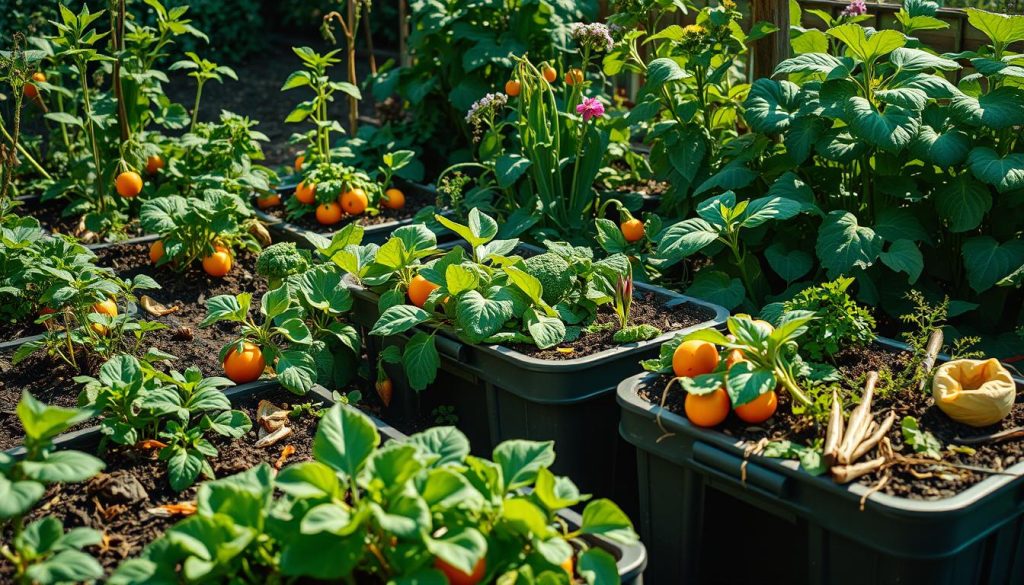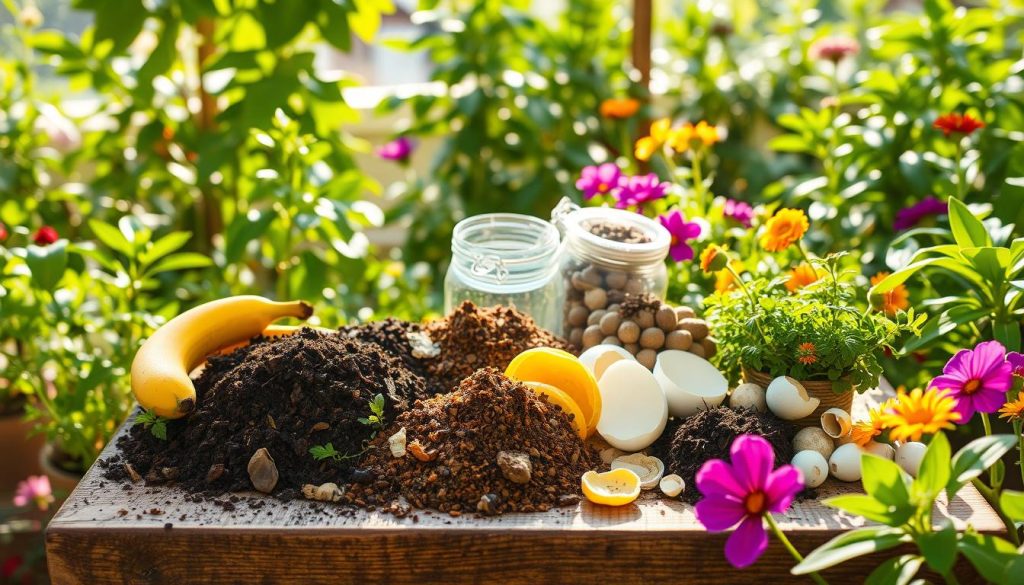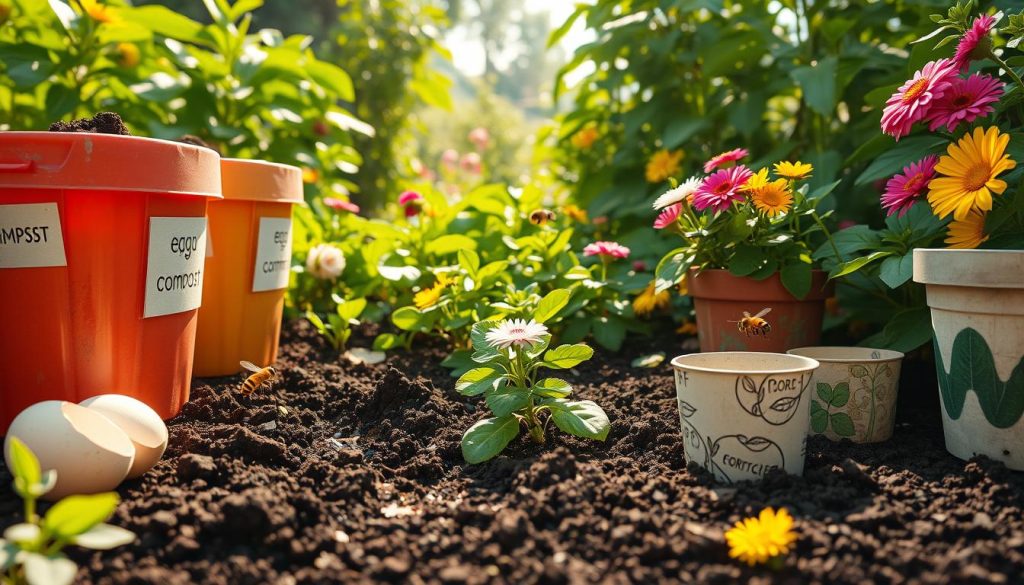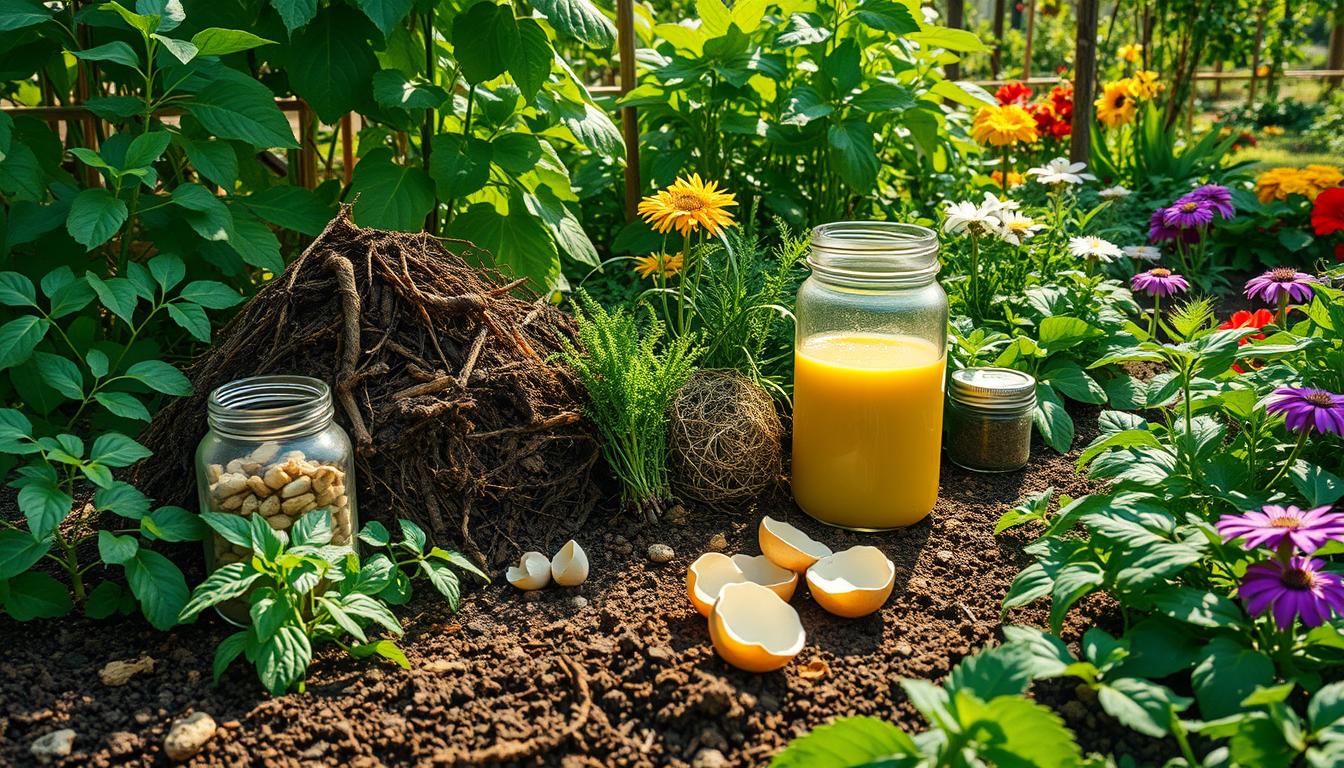I’ve been looking for ways to cut down on my carbon footprint. Zero-waste fertilizers for gardens caught my eye. They’re a green alternative to regular fertilizers, helping plants grow strong and healthy. It’s exciting to think about how they can help our planet.
By making my own fertilizers from natural stuff, I avoid harmful chemicals. It’s good for my garden and the Earth. I’m eager to learn more about these eco-friendly options and their benefits for our gardens.
What are Zero-Waste Fertilizers?
Exploring sustainable gardening, I found organic fertilizers key. Zero-waste gardening products are essential for my garden. They help reduce waste and make my garden eco-friendly. Compost and manure, for example, give plants the nutrients they need.
Zero-waste fertilizers come from natural sources like food waste and leaves. They’re full of nutrients that help plants grow well. This way, gardeners can cut down on waste and use resources wisely.
Definition and Benefits
Using zero-waste fertilizers has many advantages. They cut down on landfill waste and save water. They also support healthy soil life. Plus, you can make them at home, avoiding commercial fertilizers and their packaging.
Types of Zero-Waste Fertilizers
There are many types of zero-waste fertilizers. Here are a few:
- Compost: made from food waste, leaves, and grass clippings
- Manure: made from animal waste
- Green manure: made from cover crops and legumes
These natural options give plants the nutrients they need. They’re a great choice over synthetic fertilizers.

How to Create My Own Zero-Waste Fertilizers
As a gardener, I’m always searching for ways to lessen my environmental impact. One effective method is making my own zero-waste fertilizers from items I’d otherwise discard. This approach not only supports healthy plant growth but also cuts down on waste. I start by composting kitchen scraps, which are a treasure trove of nutrients for my plants.
I use coffee grounds, eggshells, and grass clippings to make my fertilizers. These items are packed with nutrients and are easy to add to my compost pile. Coffee grounds, for instance, are a nitrogen powerhouse, while eggshells add calcium and other minerals. This way, I craft a fertilizer that’s ideal for my eco-friendly gardening needs.
Composting Kitchen Scraps
Composting kitchen waste is a smart move to reduce waste and make a nutrient-rich fertilizer. I just collect my kitchen scraps, like fruit and veggie peels, and toss them into my compost pile. I also mix in “green” materials like grass clippings and “brown” materials like dried leaves to keep the compost balanced.
Using Coffee Grounds and Eggshells
Coffee grounds and eggshells are staples in my compost pile. Coffee grounds are a nitrogen goldmine, and eggshells add calcium and other minerals. By adding these to my compost, I create a fertilizer that’s perfect for my plants.

Incorporating Grass Clippings
Grass clippings are another valuable addition to my compost pile. They’re full of nitrogen and help speed up the composting process. By adding grass clippings, I make a fertilizer that’s rich in nutrients for my zero-waste soil.
The Environmental Impact of Zero-Waste Fertilizers
Exploring sustainable gardening, I’m excited about zero-waste fertilizers. These eco-friendly nutrients can greatly reduce our carbon footprint. They help make our planet healthier by using less waste and conserving resources.
Zero-waste fertilizers are great for reducing landfill waste. By composting food and leaves, we make a fertilizer that feeds plants well. This method cuts down on waste and saves resources. Zero-waste fertilizers offer many benefits, including:
- Less need for harmful synthetic fertilizers that pollute water and harm animals
- Water savings, as compost improves soil and cuts down on evaporation
- Healthier soil and more biodiversity, key for a strong ecosystem
Using zero-waste fertilizers in our gardens can positively impact the environment. As I delve deeper into sustainable gardening, I’m eager to learn more. I want to see how these eco-friendly nutrients can help us live greener.
How to Implement Zero-Waste Fertilizers in My Garden
To make the most of zero-waste fertilizers, knowing about soil health is key. Using the right organic fertilizers helps your garden grow strong and waste-free. Products like compost and natural fertilizers cut down on waste.
Understanding Soil Health
Soil health is vital for plants to grow well. Natural fertilizers boost soil fertility. Using zero-waste gardening products reduces the need for harmful chemicals.
Timing and Application Techniques
When and how you apply zero-waste fertilizers matters a lot. Picking the right organic fertilizer and timing it right is crucial. Try compost tea or worm casting for nutrient-rich soil.

Tips for Success
Here are some tips for using zero-waste fertilizers effectively:
- Choose the right organic fertilizer for plants based on your soil type and plant needs.
- Use natural plant food options, such as compost or worm casting, to provide nutrients to your plants.
- Apply zero-waste gardening products at the right time to ensure optimal results.
Follow these tips and use zero-waste gardening products. You’ll have a green, thriving garden that grows healthy plants and saves resources.
Common Misconceptions About Zero-Waste Fertilizers
Exploring sustainable gardening, I found many myths about zero-waste fertilizers. Some think they’re not as good or hard to use. But, my studies prove they work well and are simple to add to your garden care.
Zero-waste fertilizers help plants grow strong and cut down on waste. They make gardening greener by using kitchen scraps, coffee grounds, and eggshells. Adding grass clippings also helps.
- They are not as effective as traditional fertilizers
- They are too complicated to use
- They are more expensive than traditional fertilizers
Actually, zero-waste fertilizers are as good as the old kind and simpler to use. Choosing them makes your garden better for plants and the planet.
Reviews of Popular Zero-Waste Fertilizer Products
I’ve looked into zero-waste gardening and found some great products. The Nature’s Food Cycle Compost Bin and the Vermico Worm Castings are top picks. They can make your lawn and plants healthier.
The Nature’s Food Cycle Compost Bin makes composting easy. It turns kitchen scraps and yard waste into compost fast. Gardeners love its design and how it makes plants grow well.
The Vermico Worm Castings boost soil health. They’re full of good microbes and nutrients. Users say their plants look amazing after using Vermico’s products.
Using a compost bin or worm castings can make your garden better. It’s a simple way to create a green space. With a bit of work, your garden can become a beautiful, eco-friendly spot.

